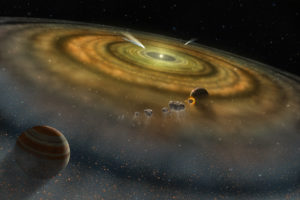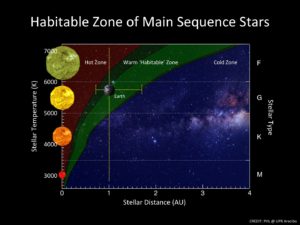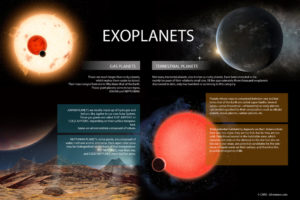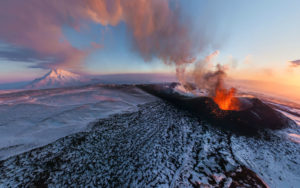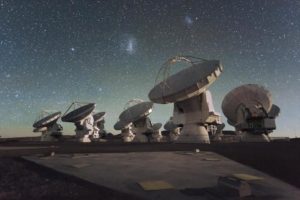Centre for Exoplanet Science related talks
Astronomy Lunchtime Talks
Tuesday, 1‐2 pm, room 222, Physics & Astronomy, North Haugh
Physics & Astronomy Colloquia
Friday, 10‐11 am, Lecture Theatre C, Physics & Astronomy, North Haugh
SEES Seminars
Wednesday, 1‐2 pm, room 310, Earth & Environmental Sciences, Irvine Building
Journal Club
Monday, 1‐2 pm, room 222, Physics & Astronomy, North Haugh
19 Feb 2021 Ana Heras: “The ESA PLATO mission and the search for habitable worlds around solar-like stars”, 10am, Physics Colloquium, MS Teams.
20 Nov 2020 François Ménard: “Observing the Fist Phases of Planet Formation: What can we learn from Edge-On disks?”, 10am, Physics Colloquium, MS Teams.
30 Oct 2020 Susanne Pfalzner: “Cradle of the Sun”, 10am, Physics Colloquium, MS Teams.
14 Oct 2020 Raymond Pierrehumbert: “Habitability-time limits for low mass stars”, 1pm, CEES Seminar Series, MS Teams.
15 Apr 2020 Raymond Pierrehumbert: “Geology determines the outer edge of the Habitable Zone”, 1pm, Forbes Room, Irvine Building. Cancelled.
14 Feb 2020 Zoe Leinhardt: “The Birth and Death of Extrasolar Planets”, 10am, Physics Colloquium.
29 Nov 2019 John Plane: “Cosmic Dust in Planetary Atmospheres”, 10am, Physics Colloquium.
22 Nov 2019 Colin Snodgrass: “Oumuamua – how alien can it be (or not)?”, 10am, Physics Colloquium.
4 Oct 2019 Darach Watson: “The origin of the rapid neutron capture elements”, 10am, Physics Colloquium.
1 Oct 2019 Graham Lee: “Contemporary explorations of exoplanetary atmospheres in 3D”, 1pm, Astronomy Lunchtime Talks, room 222.
24 Sep 2019 Paul Rimmer: “Impacts and Habitability on Exoplanets”, 1pm, Astronomy Lunchtime Talks, room 222.
19 Apr 2019 Mark Buie: “Exploring the outer solar system: A window into our past”, 10am, Physics Colloquium.
12 Apr 2019 Jane Greaves: “Spinning Space Diamonds”, 10am, Physics Colloquium.
10 Apr 2019 Peter Fawdon: “Volcanoes, water, and robots on Mars”, 1pm, School III, SEES Seminar.
5 Apr 2019 Til Birnstiel: “Building Planets – A Journey along 40 Orders of Magnitude”, 10am, Physics Colloquium.
3 Apr 2019 Richard Zeebe: “Solar system chaos and the calibration of geologic time”, 1pm, Forbes Room, Irvine Building.
15 Mar 2019 Martin Dominik: “Publishing models, assessment, and open science”, 10am, Physics Colloquium.
19 Feb 2019 Elliott Fogg: “Market-Based Scheduling for Robotic Telescope Networks”, and Oliver Herbort: “Exoplanet Atmospheres – The formation and evolution of atmospheres of terrestrial exoplanets”, 1pm, Astronomy Lunchtime Talks, room 222.
23 Nov 2018 Steve Vance: “Exploring Icy Ocean Worlds in the Solar System and Beyond”, 6pm, School 3, The Quad.
23 Nov 2018 Katherine Hawley: “Trust & Ethics in Science Communication”, 10am, Physics Colloquium.
22 Nov 2018 Steve Vance: “Geophysical Investigations of the Habitability of Icy Ocean Worlds”, 1pm, Irvine Lecture Theatre, Earth & Environmental Sciences.
22 Nov 2018 Uffe Gråe Jørgensen: “Is our solar system unique? – Is that why we are here?”, 1pm, Astronomy Lunchtime Talks, room 222.
16 Nov 2018 Simon Hodgkin: “Mapping the Transient Sky with Gaia”, 10am, Physics Colloquium.
6 Nov 2018 Christiane Helling: “Sparkling nights and fuming days on the giant gas planet WASP-18b”, 1pm, Astronomy Lunchtime Talks, Physics, room 222.
5 Nov 2018 Peter Woitke: “Gas and Dust in Protoplanetary Discs”, 1pm, SEES Seminar.
30 Oct 2018 Richard White: “Thermodynamic modelling of planetary processes using thermocalc”, 1pm, Astronomy Lunchtime Talks.
26 Jun 2018 Mark Marley: “The Promise of Exoplanet Direct Imaging with Next Generation Space Telescopes”, 1pm, Astronomy Lunchtime Talks.
18 Jun 2018 StA-CES lunchtime meeting, 1pm, Physics Staff Common Room.
23 May 2018 Frederic Moynier: “Tracing Earth’s late accretion history using HSE stable isotopes”, 1pm, SEES Seminar.
14 May 2018 StA-CES lunchtime meeting, 1pm, Physics Staff Common Room.
30 Apr 2018 StA-CES lunchtime meeting, 1pm, Physics Staff Common Room.
23 Apr 2018 Dave Waltham: “Planetary Protection: The perfect cross disciplinary subject?”, 1pm, Forbes Room, SEES.
18 Apr 2018 Mark Fox-Powell: title (Astrobiology) TBC, 1pm, SEES Seminar.
13 Apr 2018 Paul Palmer: “Retrieving chemical compositions in the solar system”, 10am, Physics Colloquium.
6 Apr 2018 Athena Coustenis: “The icy moons of the gas giants as possible habitats”, 10am, Physics Colloquium.
19 Feb 2018 StA-CES lunchtime meeting, 1pm, Physics Staff Common Room.
9 Feb 2018 Matteo Brogi: “Exoplanet atmospheres at high spectral resolution”, 10am, Physics Colloquium.
2 Feb 2018 Christiane Helling: “Exoplanets: Humanity through the lens of the Universe”, Evening Lecture, 8pm, Physics.
24 Jan 2018 Christiane Helling: “The element abundance challenge for exoplanets”, 1pm, SEES Seminar.

